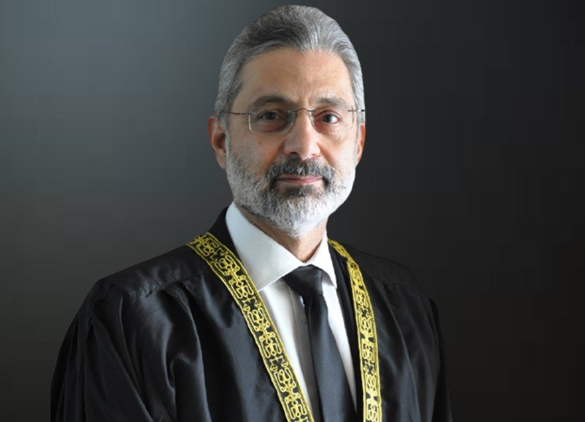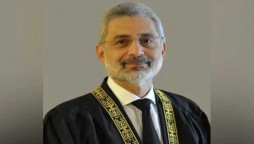- Qazi Faez Isa enrolled as an advocate of the Balochistan High Court in January 1985, and as an advocate of the Supreme Court of Pakistan in 1998.
- He has been called upon by the high courts and the Supreme Court as amicus curiae to assist in complicated cases.
- He now lives in Islamabad with his wife whom he has been married to for 36 years. He has a son and a daughter and three grandchildren.

Family and Education
Justice Qazi Faez Isa was born on October 26, 1959 in Quetta. He is the son of the late Qazi Mohammad Isa of Pishin, who was part of the Pakistan Movement and a close aide of Quaid-e-Azam Muhammad Ali Jinnah, and the grandson of Qazi Jalaluddin, the Prime Minister of Kalat state.
Justice Isa’s father was the first person in Balochistan to acquire the Bar-at-Law degree and helped establish the All India Muslim League in the province.
Justice Isa’s mother, Begum Saida Isa, was a social worker and worked in an honorary capacity on the boards of hospitals and other charitable organizations focusing on education, children, and women’s health.
After completing his primary and secondary education in Quetta, Qazi Faez Isa moved to Karachi to finish his O and A-Levels from the Karachi Grammar School (KGS).
To study law he went to London where he completed his Bar Professional Examination from the Inns of Court School Law, London. Justice Isa was called to the Bar of England and Wales (Middle Temple) in 1982.
Legal Career
Qazi Faez Isa enrolled as an advocate of the Balochistan High Court in January 1985, and as an advocate of the Supreme Court of Pakistan in 1998.
He has practiced law for over 27 years before all the High Courts of Pakistan, Federal Shariat Court, and the Supreme Court of Pakistan. He became a member of the Balochistan High Court Bar Association, Sindh High Court Bar Association, and Life Member of the Supreme Court Bar Association of Pakistan.
He remained a senior partner and head of litigation in a leading law firm before being elevated to the high court. He has been called upon by the high courts and the Supreme Court as amicus curiae to assist in complicated cases. He has also conducted international arbitrations and innumerable cases have been reported in law journals.
Balochistan High Court
After the proclamation of state of emergency on November 3, 2007, Justice Qazi Faez Isa was among the judges who refused to take oath under the Provisional Constitutional Order (PCO).
On 3 November 2007, a restraining order was issued by a seven-member bench of the Supreme Court to bar the government from implementing emergency rule.
Two years later, a list of names of judges who took oath under the 2007 Provisional Constitutional Order was referred to the Supreme Judicial Council of Pakistan.
This referral caused the Supreme Court to decide on starting contempt of court charges against the higher court justices who took the oath.
Eventually, the Supreme Court issued a landmark verdict declared the action unconstitutional and all the judges of the Balochistan High Court tendered their resignation.
On August 5, 2009, Justice Isa was directly elevated to the position of Chief Justice of the High Court of Balochistan. At the time of his elevation, Justice Isa was the solitary judge in the high court. He nominated all judges and reestablished the Balochistan High Court.
He reopened the High Court bench at Sibi which was closed for a number of years and acquired land for the construction of the High Court bench at Turbat and approved the design of its building. He upgraded all courts in Balochistan to facilitate the public.
Justice Isa introduced a transparent system of inducting officials and officers in the high court after advertising such posts. During his tenure, a large number of vacant judicial posts in the subordinate judiciary were filled after examinations and interviews.
Supreme Court of Pakistan
Justice Isa took oath as a judge of the Supreme Court of Pakistan on September 5, 2014. He became the Senior Puisne Judge of the Supreme Court after Justice Umar Ata Bandial became the Chief Justice of Pakistan on February 2, 2022.
According to the seniority list, he is scheduled to become the chief justice on September 18, 2023, for 13 months till his retirement on 26 October 2024.
Other activities
Prior to his elevation, Justice Isa regularly wrote on the Constitution, Law, Islam and Environment and his articles were published in leading newspapers.
He also co-authored the book ‘Mass Media Laws and Regulations in Pakistan’ which was the first book on the subject. He authored the booklet ‘Balochistan: Case and Demand’ published in 2007.
As a professor of law, he taught ‘Constitution of Pakistan and the Constitutional History of the subcontinent’ at Islamia Law College, Karachi till 1994.
He served in an honorary capacity as a Director on the Board of Directors of one of the leading banks in Pakistan, member of the Policy Board of Securities and Exchange Commission of Pakistan (SECP) and as member of the Quaid Mazar Management Board.
He now lives in Islamabad with his wife whom he has been married to for 36 years. He has a son and a daughter and three grandchildren.
Memogate commission
In 2012, Supreme Court formed a judicial commission headed by Justice Qazi Faez Isa tasked with probing the Memogate scandal.
The case related to a memo delivered to a high-ranking US military official at the behest of Pakistan’s Ambassador to the US Hussain Haqqani exposing a rift between the PPP government and the army.
The incident was disclosed by US-based businessman Mansoor Ijaz who said that Haqqani asked him to deliver a confidential memo asking for US assistance. Haqqani was forced to resign after the disclosure.
The Supreme Court of Pakistan opened a broader inquiry into the origins, credibility, and purpose of the memo. On 12 June, 2012, the commission released its findings and found that it was “incontrovertibly established” that Husain Haqqani had authored the memo.
The apex court finally wrapped the case up in February 2019 by stating that it is the responsibility of the state to arrest and try former envoy for high treason.
Quetta attack commission
On October 6, 2016, the Supreme Court formed a commission to investigate the suicide attack at Civil Hospital, Quetta on August 8 in which more than 70 people, mostly lawyers, were killed.
The inquiry commission led by Justice Faez Isa issued its detailed report on the incident after thoroughly examining the concerned persons and obtaining responses from relevant ministries, departments and institutions.
The report called for banning terrorist organizations without any delay by enforcing the Anti-Terrorism Act (ATA). It regretted that the then interior minister, Chaudhry Nisar Ali Khan had met the head of three banned organizations to listen to his demands.
Justice Isa penned a heartfelt letter written to the families of the deceased lawyers in the Quetta massacre.
Faizabad sit-in
In February 2019, the Supreme Court issued a strongly-worded judgment in the 2017 Faizabad sit-in case staged by the Tehreek-i-Labbaik Pakistan (TLP).
The judgment penned by Justice Qazi Faez Isa observed serious lapses by the government, media, PEMRA, intelligence agencies, armed forces, and the Election Commission of Pakistan.
The Supreme Court directed the government, law enforcers, intelligence agencies and the army’s media wing to operate within their mandate.
The court directed the federal and provincial governments to monitor and prosecute those advocating hate, extremism and terrorism, and also ordered respective chiefs of the armed forces to initiate action against personnel found to have violated their oath.
Presidential reference
Justice Isa became controversial after a presidential reference was filed against him in 2019 for concealing assets and recommended action against him.
The Supreme Court directed the tax authorities to investigate allegations against Sarina Isa, the wife of Justice Qazi Faez Isa, for not declaring three foreign properties and to submit its findings to the Supreme Judicial Council (JDC).




